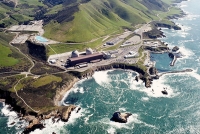It's Not about the Climate (David Legates) USofA
05.Mar.2019David Legates, Professor of Geography and Climatology, former Director of the Center for Climatic Research, University of Delaware, and a Senior Fellow of The Cornwall Alliance for the Stewardship of Creation: Is a warmer climate and more carbon dioxide a net benefit to life on the planet? The answer to this question is a resounding “YES.” More people die from exposure to cold than heat. A longer growing season is more beneficial to feeding a growing population. Carbon dioxide is plant food. So, what is the climatic benefit of spending trillions of dollars for inaccurate computer model "research," forcing the world to stop using fossil fuels and putting people's lives back to the Middle Ages?
Viv Forbes, Executive Director of The Salt Bush Club, Australia: If a project can be stopped because it adds to carbon dioxide emissions every development of coal, oil or gas in Australia can be challenged. But the ominous implications go much further. The sports and tourism industries should be fearful. These industries encourage millions of competitors, visitors, tourists, officials and politicians to use cars, trains, buses, planes and ships to burn hydro-carbon fuels purely for entertainment. Car racing is out, as are new cruise terminals, stadiums, resorts, high rise hotels and fireworks. Moreover, any new road, rail or airport development will add emissions and must be stopped. But if they can stop the mining of coking coal this will also stop metal smelting, refining and steel making.
Global Living Conditions (Max Roser) UK
15.Feb.2019Max Roser, economist, geoscientist, philosopher, Founder and Program Director, Our World in Data: To see where we are coming from we must go far back in time. When you only consider what the world looked during our life time it is easy to make the mistake of thinking of the world as relatively static – the rich, healthy and educated parts of the world here and the poor, uneducated, sick regions there – and to falsely conclude that it always was like that and that it always will be like that. In 1950 two-thirds of the world were living in extreme poverty; in 1981 it was still 42%. In 2015 – the last year for which we currently have data – the share of the world population in extreme poverty has fallen below 10%. That is a huge achievement, for me as a researcher who focuses on growth and inequality maybe the biggest achievement of all in the last two centuries.
Thorpe Watson, Ph.D. in Physical Metallurgy & Science of Materials. Thirty five year career covering wide range of science disciplines plus 10 year investigation of the climate controversy: Most societies are in dire need of scientifically astute politicians with the courage and integrity to denounce the bogus, climate-change narrative and its wrongful vilification of CO2. The use of fossil fuels will not only extend the planet’s Green Period, but it is also enabling mankind to avoid the grinding poverty prevailing prior to the widespread use of such fuels.


















